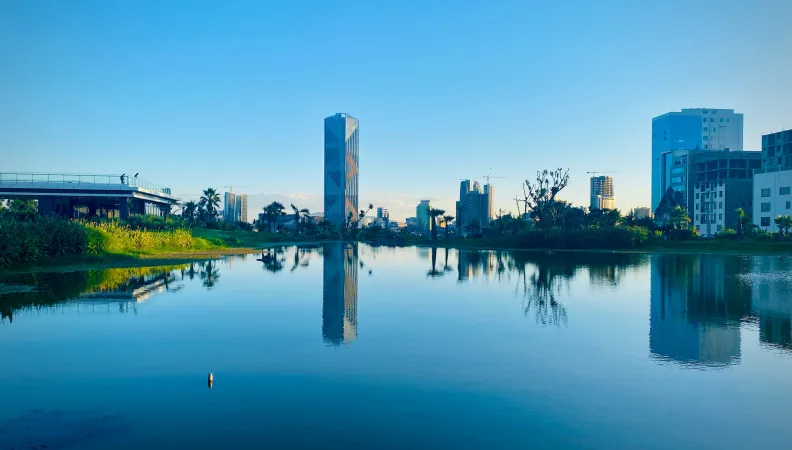Share the page
Developing a strategic framework for nature-based solutions in urban areas

-
Project start date
-
2022Status
Ongoing
-
Project end date
-
2024
-
AFD financing amount
-
222 493
-
Location
-
Kigali, Addis Ababa
-
Partners
-
Rwanda Young Water Professionals Association (RYWP), Ethiopian Institute of Architecture, Building construction and City Development (EiABC), Addis Ababa Urban Development Department
-
Research program
As part of the ECOPRONAT research programme, AFD is collaborating with the World Resources Institute (WRI) to develop a strategic framework for identifying and deploying nature-based solutions (NBS) in urban areas, taking Addis Ababa (Ethiopia) and Kigali (Rwanda) as case studies. Natural ecosystems and biodiversity are indeed essential to ensure the livability of cities, especially in the face of climate change and its impacts. Their integration into urban planning processes is also essential.
Context
According to a 2021 OECD report, two-thirds of African cities are at “extreme” risk of climate and water-related shocks. Violent climate events, heat waves and droughts are thus at the top of the risks incurred by urban areas. Rapid urbanization, unsustainable development and degradation of natural ecosystems exacerbate these risks.
Nature-based solutions (NBS), which rely on natural ecosystems and the services they provide to human activities, address these urban challenges, while simultaneously providing benefits in terms of human well-being and biodiversity. However, they are still little integrated into urban planning processes and decision support tools available to planners. The lack of knowledge, data and experimentation on nature-based solutions therefore hampers their adoption and deployment.
This project is part of the ECOPRONAT research programme, which supports research on how to better take into account biodiversity and mainstream it into key economic sectors.
Objectives
The objective of this research project is to enable, through the construction of a strategic framework, the deployment and scaling of nature-based solutions, in particular to address water and heat risks. The challenge is to improve the ecological resilience of cities by helping them identify the risks they must prepare for, to assess the potential of NBS to address them and to develop implementation and funding strategies for these NBS as part of the urban planning process.
A fast, effective and practical methodology for assessing the potential of nature-based solutions will be made available to the cities of Addis Ababa and Kigali, which are the two pilot cities of this research project. The project is led by WRI, in partnership with the Addis Ababa Urban Development Department, the Ethiopian Institute of Architecture and the Rwanda Young Water Professionals Association. This methodology is intended to be adopted by other urban centers to allow a broader appropriation and mobilization of NBS in cities.
Method
At the methodological level, the construction of a strategic framework for nature-based solutions is interesting for two reasons:
- Identification of flood risks, heat islands, water supply and biodiversity potential of cities through the production of composite maps and the mobilization of satellite data;
- Participatory construction of the strategic framework through workshops with stakeholders of both cities to validate the priority areas of intervention and identify the NBS most adapted to the issues of each area.
Results
Developed by the WRI research team with the cities of Addis Ababa and Kigali, the Strategic NbS Framework can support cities in selecting and implementing appropriate nature-based solutions (NbS). By integrating globally available data sets with local data, it helps identify areas of a given city that are susceptible to extreme flooding and heat, as well as opportunities to expand urban green spaces and create ecological corridors.
To ensure successful implementation, collaboration between public authorities, technical experts, and community leaders is essential. Using this framework, citywide maps can be quickly generated to identify priority areas. After a validation by city stakeholders, field experts then play a key role in designing effective NbS, tailored to local conditions.
Although it has limitations in data detail, the Framework provides a solid starting point to build sustainable cities. An additional guide provides technical information on usable NbS, as well as case studies. This guide is available for download below.
- Download the WRI Strategic Nature-Based Solutions Framework Guidelines
- Watch the replay of the Research Conversations webinar: A strategic framework for nature-based solutions in urban areas: Addis Ababa and Kigali
Research findings
The research project identified a series of lessons to facilitate the deployment of nature-based solutions (NbS), taking into account the specific needs of cities. These lessons highlight the potential of nature in urban resilience planning and climate action:
- To increase awareness and institutional integration:
- Set up multi-stakeholder processes to support dialogue and the prioritization of identified NbS.
- Rely on case studies to facilitate understanding and engagement.
- To enhance data availability for more effective planning:
- Combine local and global datasets to carry out multi-hazard assessments (flooding, urban heat islands, etc.).
- Encourage citizen science initiatives for data collection, and ensure it is considered in decision-making.
- To strengthen planning and implementation linkages:
- Establish dedicated governance structures (such as a mayoral committee) to coordinate various technical services involved and mobilize funding.
- Develop common reference frameworks (design standards, guidelines, etc.) to strengthen political and public support.
- To secure long-term financing:
- Integrate NbS into existing city investment programs.
- Include strategies for public-private partnerships and use a multi-benefit assessment framework to demonstrate their long-term value.
- To adapt solutions to the local context and ensure monitoring:
- Launch NbS pilot projects with monitoring systems to track their performance.
- Integrate gender, equity, and inclusion considerations from the selection phase of each NbS.
Find out more: “How can nature support resilience planning and climate action in cities?” (Lisa Beyer, WRI & Julien Calas, AFD)
Contact
- Julien Calas, research officer, AFD
